東部がんセンター
- Home
- 診療科・センター・部門
- 東部がんセンター

患者ではなく人としてみる。そんながん治療を提供したい。
今や2人に1人はがんになり、3人に1人はがんで亡くなる時代です。
がんの患者さんは手術や放射線治療、抗がん剤治療など高度な治療が必要であり、就労や子育てなどの生活の問題も解決しなくてはいけません。それらを行うには多くの高度な機能があり、たくさんのスタッフを持った病院である必要があります。国では、そのような病院を「がん診療連携拠点病院」として指定しています。
当院は、2014年8月に国から「地域がん診療連携拠点病院」に指定されました。東部がんセンターでは、患者さんが最適ながん診療を受けられるように組織されています。
コンセプト
専門スタッフ・専門チームが、患者さんとご家族をケアします
東部がんセンターは、診療科目に依存しない横断的ながん診療体制を院内で確立し、地域の周辺医療機関と連携しながら、患者さん一人ひとりに最適ながん治療を提供していきます。最先端で体にやさしい治療と充実したサービスで、地域のみなさまの声にこたえていきます。
東部がんセンター長インタビュー動画
東部がんセンター長が、当センターのコンセプトについてご説明いたします。
サポート体制のご紹介
がんと診断された時からはじまる一歩先の緩和ケア
当院では毎月2回「緩和ケア教室」を開催しており、各分野に詳しいスタッフがそれぞれのプログラムを分かりやすく解説しております。
その内容をダイジェストVTRにまとめておりますのでぜひご覧ください。

がん看護外来
診療科の依頼を受け、がん告知や治療説明の際にがん分野の専門・認定看護師が同席しています。がん告知(初発・再発)を受ける患者さんとそのご家族の苦痛を軽減できるよう、不安や心配事をお聞きし、患者さん・ご家族が納得した上で意思決定ができるようサポートしています。治療や療養の調整をお手伝いしながら、生活の質を高め、維持できるよう支援します。
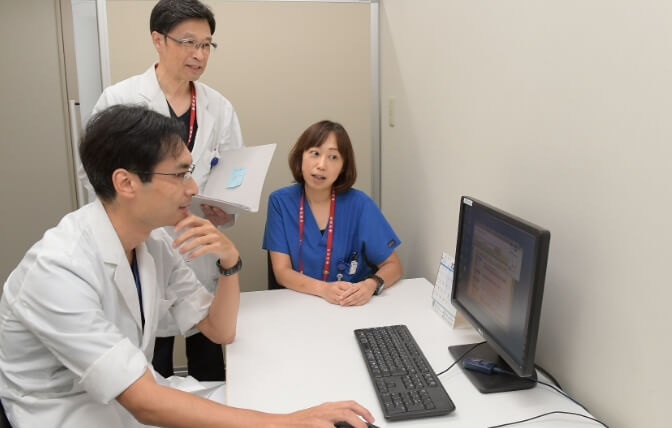
がん薬剤師外来
がん薬剤師外来では、がん治療に特化した薬剤師が、患者さんの治療継続を目指し、抗がん剤治療のサポートを行います。
治療前には抗がん剤の必要性に加え、治療計画、副作用対策、日常の過ごし方や費用等について説明し、また、治療中の吐き気や皮膚障害等の副作用には効果的な対策を提案して、医師や看護師との協力のもと一人ひとりに安全かつ最適な治療を提供します
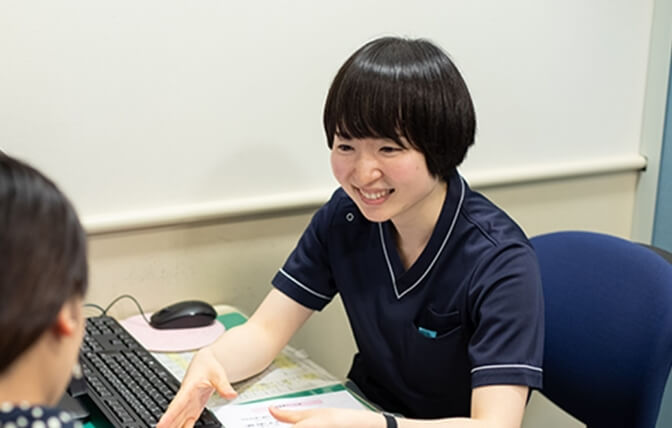
がん栄養外来
「食べられない」「味がわからない」「体重が減ってきた」など、化学療法を行う患者さんを取り巻く様々な食事の問題について、その工夫や対策など、管理栄養士がしっかりサポートさせていただきます。

緩和ケア外来
当院の緩和ケア外来は、つらい症状のコントロールが必要な方を対象としています。主治医と連携して、がんの治療を行いながら、体と心の痛みやつらさをやわらげるためのケアを行います。
緩和ケア外来では医師・看護師が面談し、症状や困っていることを伺いながら、薬剤調整や生活支援を行います。患者さんの状況に応じて薬剤師・管理栄養士・MSW(メディカルソーシャルワーカー)・公認心理師等、緩和ケアチームにて介入させていただきます。
治療方法について
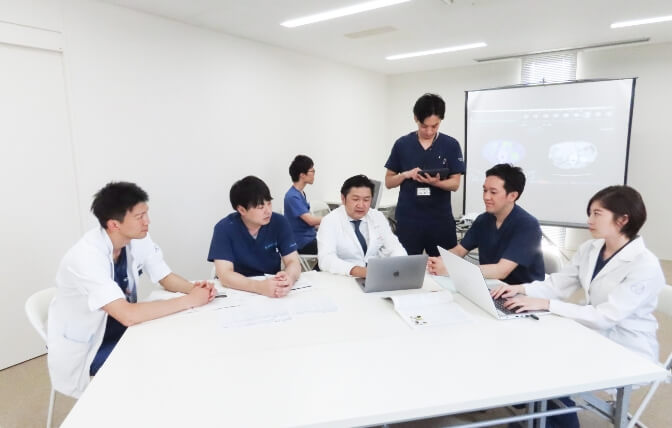
最善の治療方法を
東部がんセンターでは「標準治療」を行っています。
標準治療とは、平均的な治療法のことではなく、その時点で考えられる最も効果がある治療法をいいます。がんの主な治療法として、外科療法(手術)、放射線治療、薬物療法(化学療法)があり、これらを単独もしくは組み合わせてどのように治療するかは、患者さんの状態やステージによって決まります。
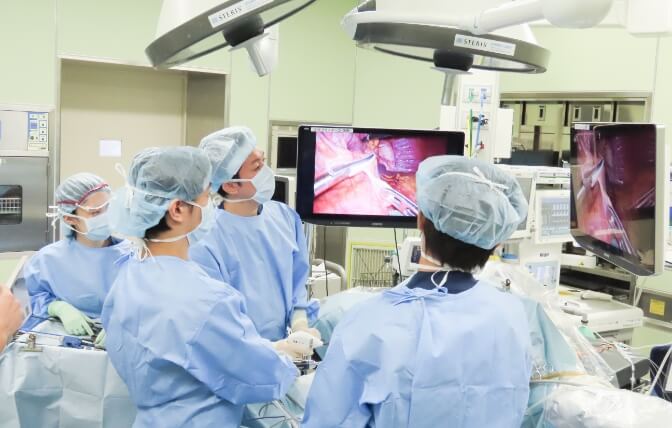
外科療法(手術)
外科療法は、がん診療の中核をなすものです。
●どういう患者さんに手術をするべきか?
●手術のリスクはどうか?
●より低侵襲な方法で可能ではないか?
などを検討する必要があります。当院ではあらゆるがん領域の腹腔鏡手術、ロボット支援手術などの低侵襲手術に注力しています。
2020年悪性腫瘍年間手術件数 1,306件
(地域がん診療連携拠点病院基準:400件以上/年)
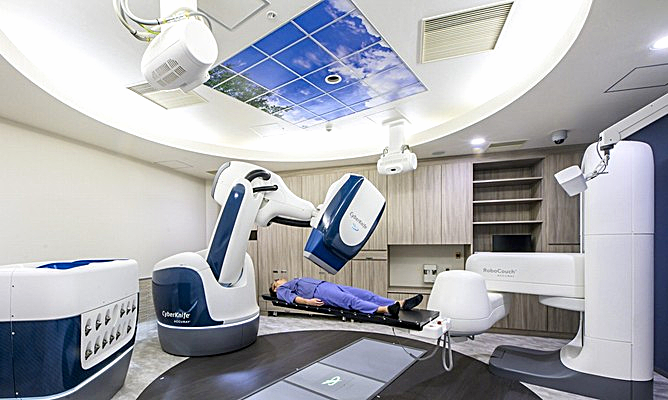
放射線治療
高精度放射線治療装置サイバーナイフを用いた体幹部定位照射を積極的に行っています。肺がん、肝細胞がん、前立腺がんに対する体幹部定位照射の症例数は神奈川県内有数です。
2019年からは最新型リニアックも稼働を始めました。副作用の少ない治療を心がけています。
2020年放射線療法年間患者延べ数 668人
(地域がん診療連携拠点病院基準:200件以上/年)
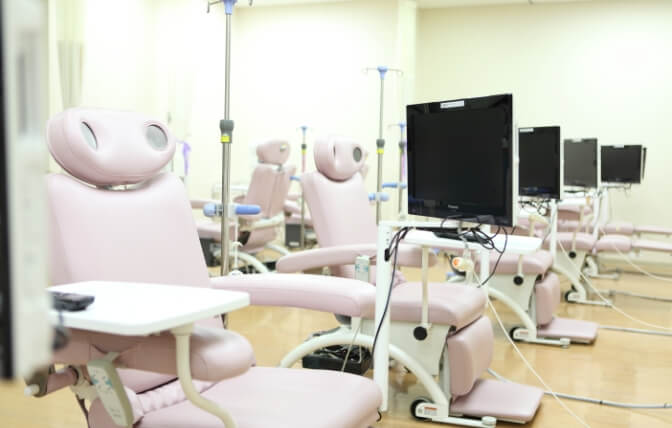
薬物療法(化学療法)
5大がんをはじめ、頭頸部、皮膚がんなどにも対応し、放射線治療との併用も行っています。
がん薬物療法に特化した専門的知識を持つ薬剤師・看護師が患者さんの状態をチェックし、必要時には多職種と連携しながら、適切なケアとアドバイスを行っています。
2020年薬物療法年間患者延べ数 1,118人
(地域がん診療連携拠点病院基準:1,000件以上/年)
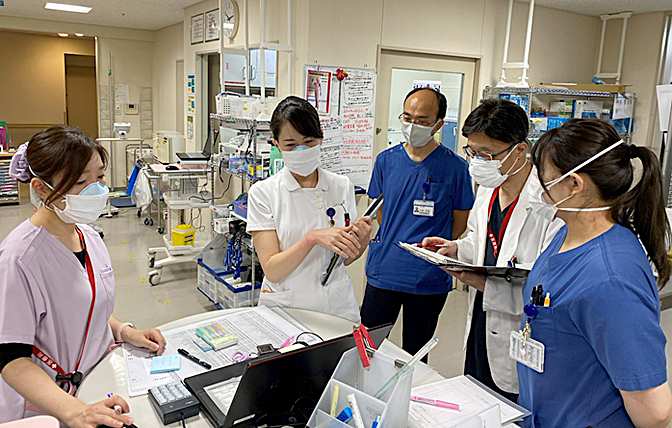
緩和ケア
がんと診断されると気持ちが落ち込むこともあります。また、診断を受けたとき、すでに痛みや息苦しさなどの症状がある場合もあります。
緩和ケアは、そのような気持ちの落ち込みや体の症状に対して、がんと診断された時から治療と並行して始まります。緩和ケアは、がんが進行してから始めるものではありません。がんの治療とともに、つらさを感じるときにはいつでも受けることができます。また、ご家族等もケアの対象です。
身体への負担の少ない一歩先の医療を
エビデンス(科学的根拠)に基づく標準的な治療を基本に、患者さん一人ひとりに合ったオーダーメードの治療を提供することで、ご本人はもちろん、ご家族にも安心・満足していただけるよう心がけております。
そのためにも、常に「一歩先の医療」をめざし、手術支援ロボット「ダビンチ」やロボット型放射線装置「サイバーナイフ」など、最新の治療法も導入しております。さらには、全世界で取り組まれている患者さんを中心とした周術期管理プログラムである「術後回復能力強化(enhanced recovery after surgery:ERAS)プログラム」の概念を取り入れ、患者満足度を重視したプロトコールを実践しています。
東部がんセンターの治療の流れ
がんと分かってから治療を受けて退院するまで、多くの専門職が関わり、患者さんをしっかりフォローいたします。
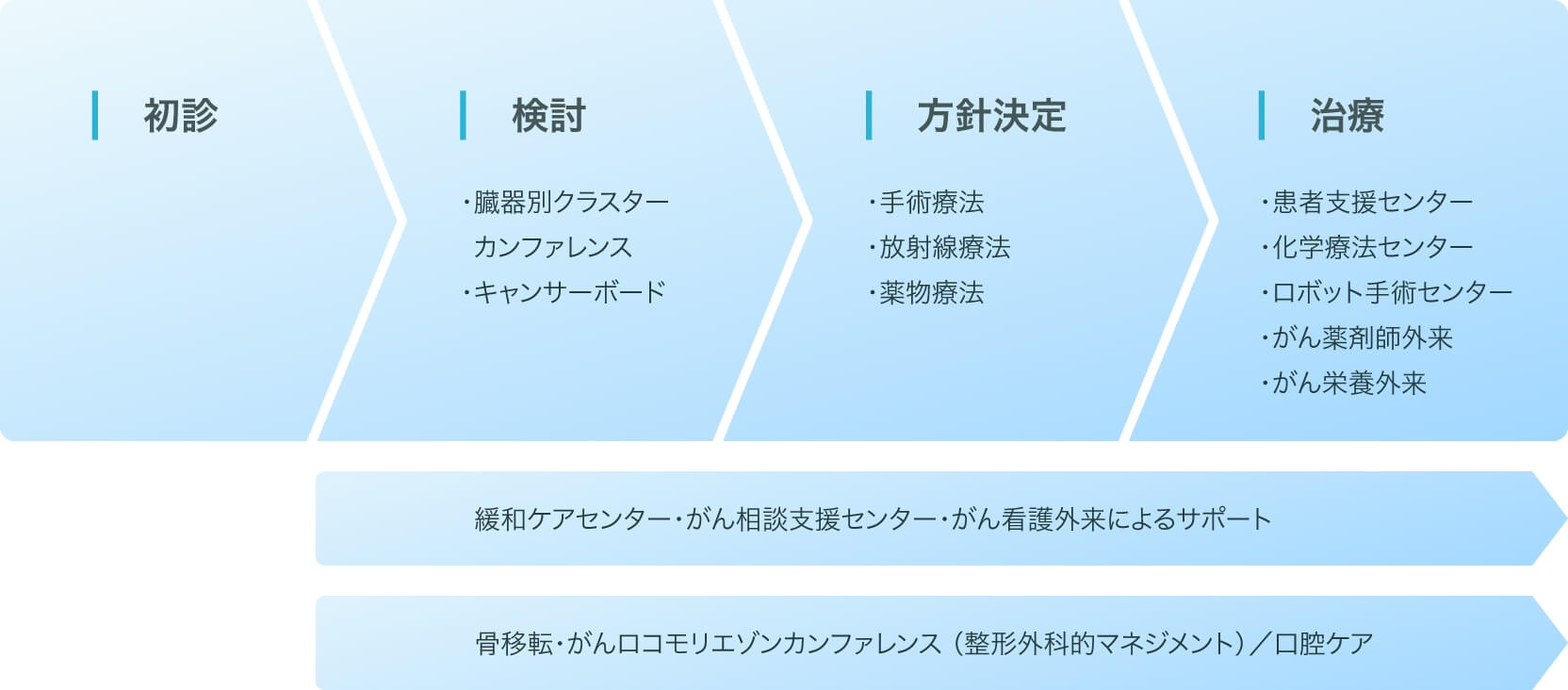
東部がんセンターの取り組み

キャンサーボード
キャンサーボードとは、がん患者さんに最善の治療を提供する目的で開催している検討会のことです。
緊急キャンサーボードは原発不明がんや重複がんなど、診療科の垣根を越えた検討が必要な場合に開催し、定例キャンサーボードは、がん診療に関わる全ての医療スタッフを対象に、知識と情報の共有を目的とした事例検討・講義を行っています。
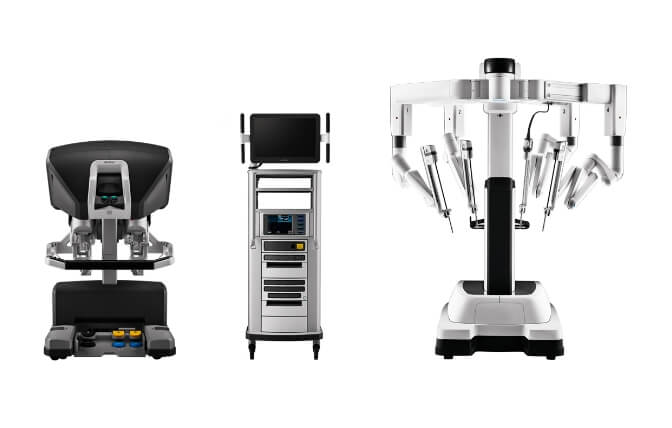
ロボット手術センター
ロボット支援手術は緻密で複雑な手術操作が可能で、難しい手術をより安全に実施することができます。また、腹腔鏡と同じ内視鏡手術のため、患者さんの身体にやさしい治療です。
当院では2012年から手術支援ロボット「ダビンチ」を使用しており、累計およそ2,000例の実績があります。
骨転移・がんロコモリエゾンカンファレンス
骨転移の症状および合併症である疼痛、病的骨折、脊髄麻痺などは日常生活動作の低下や予後の悪化の恐れがあるため、早期診断・早期治療、その後の整形外科的マネジメントが重要です。
骨転移がんの患者さんを支えるために、整形外科、放射線診断科、放射線治療科、リハビリテーション科など複数の診療科で、診断・治療方針を検討し情報共有することで、緊急手術の大幅な減少、QOL(生活の質)の維持・向上を実現しています。
臓器別クラスターカンファレンス
ひとりの患者さんが「がん」になっても、その人にとって適切な治療が手術なのか、内視鏡治療なのか、抗がん剤治療なのか、それぞれ事情は異なります。
臓器別クラスターカンファレンスではそれぞれの臓器ごとに、内科、外科などが患者さん一人ひとりにとって最適な治療を合議で決定していきます。
決して初診医の個人的な考えでは治療方針は決まりません。病院としてのがん診療の質を担保するものです。
口腔ケア
口腔は食事をするための大切な器官です。がん治療の副作用が口腔粘膜炎(口内炎)となって現れる事がありますが、口の中の乾燥や疼痛があると食事の摂取が困難となりQOLの低下を招きます。しっかりと口腔ケアを行い口腔内を清潔に保つ事が重要です。
口腔の機能を維持するための口腔ケアは、がん治療の重要な支持療法です。東部がんセンターでは、地域の歯科クリニックと連携体制で行っています。
がんゲノム医療
がん細胞のゲノムを調べて、どの遺伝子に変化が起こっているのかを知り、それぞれの患者さんのがんがどのような性質のがんなのか、どのような治療法が適しているのかを選択していくのが、がんゲノム医療です(※1)。
遺伝子パネル検査とは、がん細胞に起きている遺伝子の変化を調べ、がんの特徴を知るための検査です。がんの特徴が分かれば、一人ひとりに適した治療法を探すことができます。
患者さんのがん組織や血液を使って、がん細胞の数十から数百の遺伝子を一度に調べ、その中で起きている遺伝子の変化を確認します。(※2)
当院では遺伝子パネル検査は行っていませんが、必要な患者さんが検査を受けられるよう近隣のゲノム医療提供病院連携しています。
検査を希望される場合、または検査について詳しいことをお聞きになりたい場合は担当医やがん相談支援センターにご相談ください。
※1、※2 「がんゲノム医療とがん遺伝子パネル検査」ウェブサイトより
「地域がん診療連携拠点病院」として
地域と東部がんセンター
手術や放射線治療は当院での治療が必要ですが、高血圧や糖尿病などの併存疾患の治療や治療後の経過観察などは患者さんのご自宅近くで診療を受けられるよう医療機関と連携し、長く続くがん診療をなるべく負担なく行えるような体制を整えています。医療機関同士の情報交換を徹底的に行うため地域連携パスなどを使用し、患者さん・病院間での情報共有にも努めています。
連携先医療機関様用
がん地域連携パス返信シート
地域がん診療連携拠点病院
厚生労働省の指定する「地域がん診療連携拠点病院」として、専 門的ながん医療の提供、地域の他の医療機関との連携、がん患者さ んに対する相談支援、情報提供などを行っています。
がん診療連携拠点病院
PDCAサイクルの実践 がん診療の質と安全の向上のための取り組み
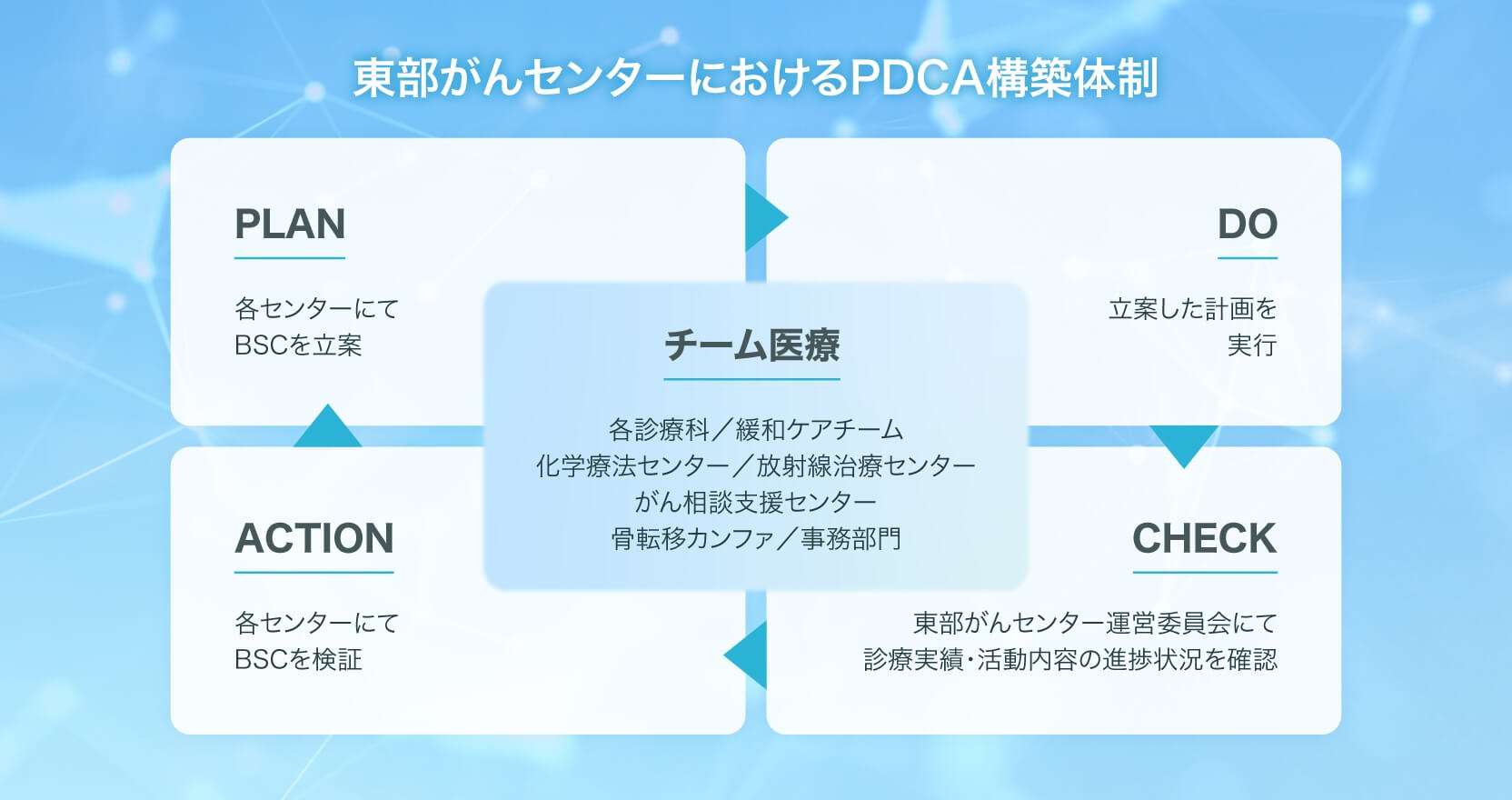
計画(plan)、実行(do)、評価(check)、改善(action)のプロセスを順に実施するマネジメントサイクルの 1 つであり、このらせん状のプロセスを繰り返すことによって、品質の維持・向上および継続的な業務改善活動を推進するマネジメント手法がPDCA サイクルであると定義されております。 当院では、PDCAサイクルを用いて自施設の診療機能や診療実績、地域連携に関する実績や活動状況の他、がん患者の療養生活の質について把握・評価し、課題認識を院内の関係者で共有した上で、がん診療の質・安全性の向上や組織的な改善策に取り組んでいます。
院内がん登録
がん登録とは、国のがん対策の基礎となる、がん患者数や罹患率、生存率、治療効果などを把握することを目的に、がん治療のために病院を受診した患者さんの治療内容、治療効果や予後などの情報を集め、把握・分析する仕組みです。患者さんへの的確な情報提供や、次のがん対策のための基礎資料としてがん登録は必要不可欠なものです。
国が指定する登録様式(がん診療連携拠点病院院内がん登録標準登録様式(2016年版修正版))に準拠して、院内がん登録を実施する事が義務付けられています。
院内がん登録について詳細をお知りになりたい方は、国立がん研究センターがん情報サービス「院内がん登録 全国集計 結果閲覧システム(0年集計)」をご覧ください。
全国がん登録とは
「全国がん登録」とは、日本でがんと診断されたすべての人のデータを、
国で1つにまとめて集計・分析・管理する新しい仕組みです。この制度は2016年1月に始まりました。
院内がん登録とは
院内がん登録は、病院で診断されたり、治療されたりしたすべての患者さんのがんについての情報を、
診療科を問わず病院全体で集め、その病院のがん診療がどのように行われているかを明らかにする調査のことです。
院内がん登録の実施に係る指針(厚生労働省告示第470号)では、「病院において、がん医療の状況を適確に把握するため、当該病院におけるがん患者について、全国がん登録情報よりも詳細な治療の状況を含む情報を収集し、院内がん登録データベースに記録し、及び保存すること」とされています。
*生存確認調査業務
院内がん登録では、がん患者さんの診断から治療後3年・5年・10年の経過を把握し、生存率を計算するための基礎資料をつくっています。この経過を把握するための作業を生存確認調査といいます。調査方法は、外来の通院状況の確認や連携病院からの情報提供などですが、治療が終了していたり転院や転居などにより当院での受診が継続されていない場合には、市区町村に住所地照会を依頼したり、患者さんまたはご家族に書面または電話調査をさせて頂くことがあります。この調査を行うことにより得られた情報は、院内がん登録・全がん協(全国がん〔成人病〕センター協議会)の生存率集計の届出など、疫学的研究、がん医療の評価として国のがん対策に役立てられています。
5ヵ年推移(累計)
集計対象期間:2019年1月1日〜2023年12月31日
項目
● 院内がん登録総数診断年別
● 診断時年齢階級別登録数
● 男女別登録数
2023年登録集計
集計対象期間:2022年1月1日〜2023年12月31日
項目
● 男女別/年齢階級別 登録数
● 診断時住所別 登録数
● 主要5部位・前立腺・子宮頸部/男女別 登録数
● 治療前ステージ別/初回治療別
項目の解説
● 部位別
男女別・年齢別に集計
● 男女別・年齢別
主要5部位(胃・大腸・肝・肺・乳腺)・前立腺・子宮頸部・膵・食道について集計
● 病期(ステージ)UICC8版
UICC(国際対がん連合)の定める病期分類に基づき、病期(ステージ※)別に分類。
UICCでは治療を開始する前(臨床分類)と手術後の病理学的評価(病理学的分類)の分類を行うこととなっている。
※がんの拡がりを0期~Ⅳ期(部位により異なる)で表し、数字が大きくなるほど、がんが進行していることを示している。
● 治療内容別
当院で実施された初回治療(継続)の内容
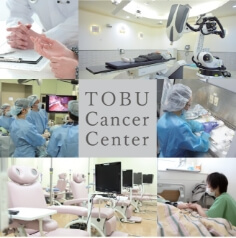
当院のがん治療についてコンパクトに紹介しています。





